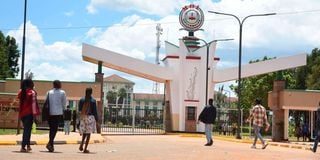
The entrance to Moi University's main campus in Kesses, Uasin Gishu County on February 08, 2024.
Moi University staff who have secured loans from financial institutions but have failed to repay the money may have their property auctioned after the management failed to remit statutory deductions.
Banks and microfinance institutions have sued some 124 members of the Kenya University Staff Union (Kusu) for defaulting on loans amounting to millions of shillings through the check-off system.
Some of the lawsuits have been filed in the Small Claims Courts at the Eldoret Law Courts, while other members have received notices to either repay the loans or have their property auctioned to recover the money.
Members of Kusu, Moi University Chapter, went on strike to protest against delayed salaries, non-remittance of bank loans, pensions and other third-party deductions.
“Due to non-remittance of third party deductions, workers who have bank loans have been taken to court over defaults, causing them a lot of mental anguish as they are likely to lose their property to recover the money,” said Bob Odhiambo Ng’ura the Kusu Moi University branch chairman.
“Take note that on 20th October 2019, you applied and were granted a loan facility worth Sh2,110,350 by our client. As a result of your default, the loan account has fallen into arrears and it is outstanding to the tune of Sh3,131,203,50 as of 27th March 2024,” stated a demand notice to one of the members who has been instructed to settle the loan in the next seven days.
However, the sued employees argue that their employer (Moi University) has been deducting the money but not remitting the sum to service the loans.
Strike
“My employer has been deducting the money from my salary through check-off but not remitting the same to the claimant and as such, the claimant is out to make a claim against the third party,” argued one of the members who wants Moi University management to take responsibility for defaulting to service the loan.
The unionists on Tuesday, August 13, confirmed that the strike was on in the three campuses-main campus at Kesses, College of Health Sciences and the Annex School of Law.
“It is unfortunate that the workers have not been paid their July salaries. The delay in the release of monthly salaries is hurting workers. Other public servants usually get early salaries. Moi University has to wait until around the 15th of next month to get the previous month’s salary. We demand early release of monies meant to pay workers,” added Mr Odhiambo.
He asked the university management to honour the 2017-2021 Collective Bargaining Agreement (CBA) and implement annual staff salary increments.
Vice Chancellor Isaac Kosgei admitted the delay in releasing the salary, noting that they were working on resolving the financial challenges facing the institution.
“Although there are some delays, the workers cannot go for months without pay. We have some issues with capitation but we are trying our best to address the issue,” said Prof Kosgei on phone.
The workers claimed the university was mulling a reduction in staffing levels as part of its cost-cutting measures.
“Workers have vowed not to go home in redundancy. The current staff numbers are inadequate for the operations of the university,” added Mr Odhiambo.
The university issued a memo last year on staff redundancy in a move to align the human resources to the existing workload.
“This is to notify you of impending redundancy of staff due to continued strain by the university to fully fund its wage bill…and align the human resources to the existing workload,” read the memo. “As necessary, staff will be selected for redundancy based on set criteria. The university will keep you informed of any developments,” stated the memo by Prof Kosgei late last year.
Debt
The university has in the past admitted that its debt has accrued to more than Sh5 billion, threatening to paralyse smooth operations.
Among factors contributing to the financial woes facing the institution are the declining student enrolment from 50,000 in 2015 to 27,000 in 2021, closure of non-viable campuses, reduced exchequer funding due to the implementation of differentiated Unit Cost (DUC) in computing the recurrent capitation and rising cost of personnel enrolment due to National Collective Bargaining Agreements (CBAs) that have not been fully funded.
“With the decline in student numbers and the subsequent closure of non-viable campuses, the university maintained the staff despite the closure of subsequent campuses and a decline in revenue,” said the vice-chancellor in an earlier memo
The institution has embarked on income-generating activities to raise funds to sustain its operations and contribute to the country's food security.
Prof Kosgei disclosed that apples cultivated at the institution’s farm with the produce expected to the market within the next few months even as the institution targets to expand the production from the current 100 acres to over 500 acres in the next two years.
The institution also intends to invest in pig, dairy and poultry farming as well as revive Elimu millers to help raise funds to sustain its operations in the wake of dwindling capitation from the national treasury.
However, the workers have petitioned the government to clear pending bills for public universities to enable them to remain financially afloat.
“The government promised to meet all the pending bills in public universities. Nothing has happened to date. Other State Corporations have had their pending bills paid by the government. We demand immediate payments of pending bills to bail out the university workers who have loans and other obligations,” said Mr Odhiambo.
Prof Kosgei, however, said the matter was being handled by the pending bills committee.
He defended the new funding model noting that it will help resolve some of the financial challenges facing most public universities.







